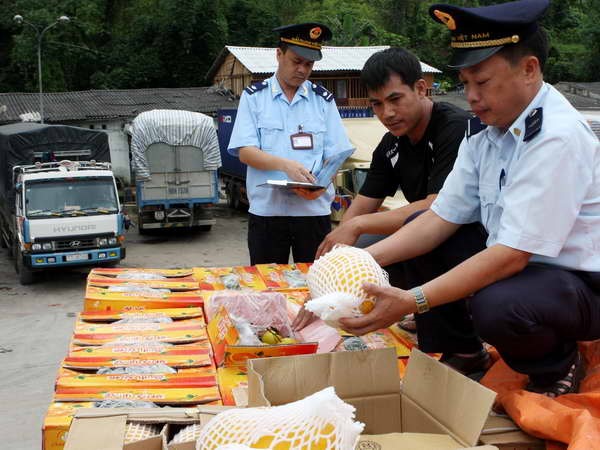Multi-dollar tax evasion discovered in import companies
 |
| Customs officials inspect fruit imported from China at the Tân Thanh border gate in the northern province of Lạng Sơn. - VNA/VNS Photo Trần Việt |
The Law on Value Added Tax (VAT) regulates that unprocessed, or preliminarily processed, agricultural, forestry and aquatic products imported from foreign countries are not subject to VAT. However, if these imported products are sold to individuals and small business vendors in the country, they are subject to a VAT rate of 5 per cent.
In recent years, customs agencies have applied technology in tax collection, which allows enterprises to use email and digital signatures for customs and tax declarations online, as well as allowing them to write, print invoices and pay taxes by themselves without requiring submission of lists of goods purchased and sold during each tax period.
A number of enterprises have taken advantage of these methods, importing unprocessed agricultural, forestry and aquatic products from China and selling them to local business vendors and individuals without paying taxes to local tax agencies, the Hải quan (Customs) newspaper reported.
The process of founding fake companies to import goods and evade taxes is no longer trivial but practised on a wide scale, according to the report.
Thirty-four out of 93 enterprises that imported goods through the Tân Thanh border gate last year were found to not have declared VNĐ1.15 trillion (US$50.7 million) worth of imported goods that were sold to locals, according to the customs agency of the northern province of Lạng Sơn.
Tax payment fraud worth VNĐ53 billion ($2.3 million) was discovered in eight enterprises. Twenty-nine other enterprises listed an amount of goods – which was sold to locals, hence subject to 5 per cent VAT – as having the same or higher value than the amount of goods they imported.
In particular, the Lạng Sơn Agriculture, Forestry and Fishery Import-Export Co. Ltd., was found to have avoided paying VNĐ23 billion ($1 million) in tax. The company’s director, whose name was included in the invoices, was found to not be involved in directing the company.
The Trường Sơn Trading Co. Ltd., registered in the coastal Quảng Ninh Province’s Hồng Thái Đông Commune, was found to have avoided paying VNĐ12.4 billion ($545,600) in tax. The commune’s authorities said such a company never existed.
What the stars mean:
★ Poor ★ ★ Promising ★★★ Good ★★★★ Very good ★★★★★ Exceptional
Latest News
More News
- Congratulations from VFF Central Committee's int’l partners to 14th National Party Congress (January 25, 2026 | 09:46)
- List of newly-elected members of 14th Political Bureau announced (January 23, 2026 | 16:27)
- 14th Party Central Committee unanimously elects To Lam as General Secretary (January 23, 2026 | 16:22)
- List of members of 14th Party Central Committee announced (January 23, 2026 | 09:12)
- Highlights of fourth working day of 14th National Party Congress (January 23, 2026 | 09:06)
- Press provides timely, accurate coverage of 14th National Party Congress (January 22, 2026 | 09:49)
- Press release on second working day of 14th National Party Congress (January 22, 2026 | 09:19)
- Minister sets out key directions to promote intrinsic strength of Vietnamese culture (January 22, 2026 | 09:16)
- 14th National Party Congress: Renewed momentum for OVs to contribute to homeland (January 21, 2026 | 09:49)
- Party Congress building momentum for a new era of national growth (January 20, 2026 | 15:00)
















 Mobile Version
Mobile Version